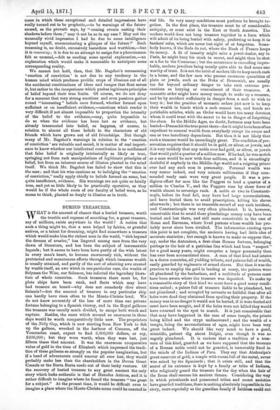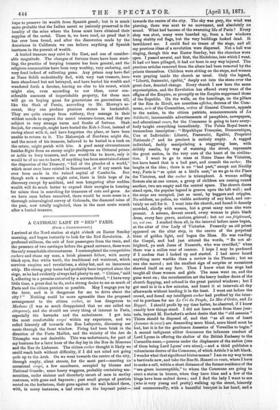BURIED TREASURES.
WHAT is the amount of chance that a buried treasure, worth the trouble and expense of searching for, a great treasure, say of millions, exists anywhere in the world ? A notion that such a thing might be, that a man helped by fairies, or grateful natives, or a talent for dreaming, might find somewhere a treasure which would make him the richest man in the world, "rich beyond the dreams of avarice," has lingered among men from the very dawn of literature, and has been the subject of innumerable legends ; but it seems to have been born partly of the wish latent in every man's heart, to become enormously rich, without the protracted and monotonous efforts through which immense wealth is usually attained, and partly of the sort of admiring awe created by wealth itself, an awe which in one particular case, the wealth of Solyman the Wise, our Solomon, has infected the legendary litera- ture of whole countries. Sunk treasures there must be, for plate ships have been sunk, and fleets which may have had treasure on board—why does not somebody dive about Salamis?—but the amount of treasure in any particular ship can hardly have risen often to the Monte-Christo level. We do not know accurately of the loss of more than one private fortune belonging to a Spanish viceroy, and iu the Royal galleons the treasure was usually much divided, to escape both wreck and capture. Besides, the sums which seemed so enormous in those days would be worth comparatively little now. The proprietors of the Nelly Gay, which is now starting from New York to fish up the galleon, wrecked in the harbour of Cumana, off the Venezuelan coast, expect to find 3,000,000 dollars, or say, £600,000; but they were worth, when they were lost, just fifteen times that amount. It was the enormous comparative value of gold in the time of Elizabeth which impressed the tradi- tion of these galleons so strongly on the popular imagination, but if a band of adventurers could recover all ever lost, they would probably make less than the shareholders in the Devon Great Consols or the Barra Barra made out of their lucky venture. Of the recovery of buried treasure to any great amount the only story which looks authentic is that of Herodes Atticus, and it is rather difficult to imagine where he found the treasure " too great for a subject." At the present time, it would be difficult even to imagine a place where the Monte-Christo scene could be enacted in real life. So very many conditions must perforce be brought to- gether. In the first place, the treasure must be of considerable antiquity, or must exist in the East or South America. The modern world does not heap treasure together in a form which will admit of its being buried with safety, preferring to keep it in bankers' safes, which are never lost sight of or forgotten. Some- body knows, if the Reds do not, where the Bank of France keeps its money. A fit of insanity might seize a jewel-dealer, say in Paris, he might bury his stock in secret, and might then be shot as a foe to the Commune ; but the occurrence is exceeding impro- bable, modern jewellers being usually quite able to find some one worthy of trust. It is not the habit of modern life to keep much cash in a house, and the few men who possess enormous quantities of plate or jewels, such as the Duke o! Brunswick, are usually too far beyond ordinary danger to take such extreme pre- cautions as burying or concealment of their treasures. A monastic order might have money enough to make up a treasure, and be by accident sufficiently in danger from a mob to wish to bury it ; but the practice of monastic orders just now is to keep their wealth in bonds which a mob cannot use, and bonds are perishable articles, while an Order would have too many devotees whom it could trust with the secret to be in danger of forgetting the clues. In the Middle Ages, no doubt, fortunes may have been buried—Dumas hit the true point there—for it might have been of ten expedient to conceal wealth from everybody except its owner and one or two hereditary dependents. But then it is not likely that such a treasure would be exceedingly great. The condition of pre- servation requires that it should be in gold, or silver, or jewels, and it is very unlikely that any noble ever had gold, or silver, or jewels that would yield a quarter of a million now. If he had, be was as rich as a man would be now with four millions, and it is exceedingly doubtful if anybody in the Middle-Age world not a reigning prince ever had any such sum in personalty. Personal wealth was very scarce indeed, and very minute millionaires if they com- manded ready cash were very great people. It was a pro- digious effort for men like the Fuggers to lend a quarter of a million to Charles V., and the Fuggera rose by sheer force of wealth almost to sovereign rank. A noble or two in Constanti- nople, before its final fall, may have had large accumulations, and have buried them to avoid proscription, killing his slaves afterwards ; but there is no traceable record of any such incident, and Constantinople was very often plundered. It is, however,. conceivable that to avoid these plunderings money may have been. buried and lost there, and still more conceivable in the case of Rome and Ravenna, where lived persons whose wealth has pro- bably never since beeu rivalled. The information existing upon• this point is not complete, the ancients having had little idea of accurate statistics ; but enough is known to make us suppose that,. say, under the Antonines, a first-class Roman fortune, belonging perhaps to the heir of a patrician line which had been " suspect "- for a good many years, might comprise a larger personalty than has ever been accumulated since. A man of that kind had estates in a dozen countries, all yielding tribute, and palaces full of wealth, easily guarded by regiments of armed slaves. But then it was the practice to employ the gold in lending at usury, the palaces were all plundered by the barbarians, and a multitude of persons must have been aware where the treasure was deposited. To make up a reasonable story of that kind we must have a good many condi- tions united ; a palace full of treasure liable to be plundered, but not plundered ; and occupied by servants so faithful that after all heirs were dead they abstained from spoiling their property. If the- money was in no danger it would not be buried, if it were buried aid must have been sought, and if the heirs were not killed they would have returned to the spot to search. It is just conceivable that that may have happened in the case of some temple, the priests being killed and the crypt undiscovered ; and the wealth of a temple, being the accumulations of ages, might have been very great indeed. We should like very much to have a good, scientific, patient dig about Delphi, even though it was so eagerly plundered. It is curious that a tradition of a trea- sure of this kind, guarded as we have supposed that the treasure of a Roman noble could not be guarded, is immovably fixed in the minds of the Indians of Peru. They say that Atahualpa's great reservoir of gold, a temple with rooms full of the metal, never was seized by the Spaniards ; that it exists still, and that the secret of its existence is kept- by a family or tribe of Indians, who religiously guard the treasure for the day when the heir of the Incas shall resume his ancient throne. Considering the way in which priezthoods and persecuted tribes and secret societies have guarded traditions, there is nothing absolutely impossible in the story, more especially as the guardian family if faithless could not
hope to preserve its wealth from Spanish greed ; but it is much more probable that the Indian secret so jealously preserved is the locality of the mine where the Incas must have obtained their supplies of the metal. There is, we have read, no proof that it has ever been found, and after the discoveries made by the Americans in California we can believe anything of Spanish inertness in the pursuit of wealth.
A buried treasure may exist in the East, and one of consider- able magnitude. The changes of fortune there have been start- ling, the practice of burying treasure has been general, and the religious communities have been very wealthy, very enduring, and very fond indeed of collecting gems. Any prince may have fled as Nana Sahib undoubtedly fled, with very vast treasure, have been abandoned but not betrayed, and have buried his wealth and wandered forth a devotee, leaving no clue to his secret, which might also, even according to our ideas, cover con- siderable amounts of imperishable property, for these men will go on buying gems for generations on generations till, like the Shah of Persia, according to Mr. Murray's ac- count, they can produce precious stones iu bucketsfull. They are quite exempt from robbery, they manage in their wildest moods to respect the secret treasure-house, and they are subject to very strange turns and freaks of fortune. Shah Soojah, for example, might have buried the Koh-i-Noor, instead of racing about with it, and have forgotten the place, or have been unable to return to it. The Maharajah of Bud wan might die, and the secret of his treasure, believed to be buried in a tank on the estate, might perish with him. A good many circumstances besides flight from an enemy might predispose an Oriental prince or noble to bury treasure, and one would like to know, only it would be of no use to know, if anything has been ascertained about
the dispersion of the Treasury, " full of the plunder of a world," which must once have existed in Samarcand, or if any search has ever been made in the ruined capital of Cambodia. But though such a treasure might exist, there is little hope of its discovery except by accident, and men hungering after sudden wealth will do much better to expend their energies in hunting for mines than in searching for treasures of coin and gems. As we have once before remarked, there would be more sense in a thorough mineralogical survey of Golconda, the diamond mine of the past, now totally neglected, than in the most acute search after a buried treasure.



































 Previous page
Previous page